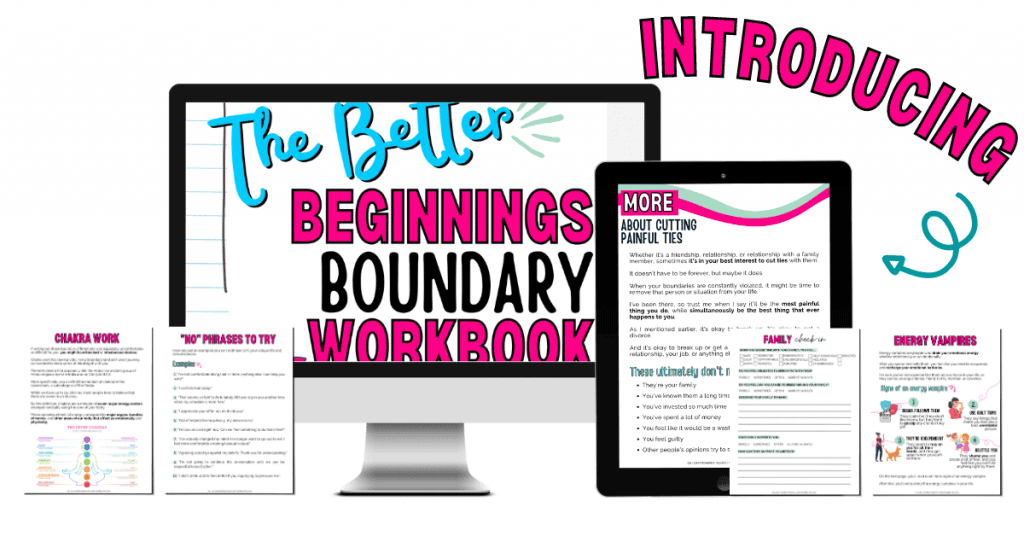
DISCLOSURE: I am not a mental health professional. If you need help finding a mental health care provider, call 1-800-662-HELP (4357) or visit Online Therapy to call, message, or video chat a certified therapist online. This post contains affiliate links. As an Amazon Associate, I earn from qualifying purchases. I may also receive compensation from Online Therapy or other sources if you purchase products or services through the links provided on this page. You can read my full disclaimer.
How to Set Boundaries with Toxic Family Members
If you have a toxic family member that constantly brings negativity into your life, you might be wondering how to set boundaries with them.
Maybe they constantly criticize you, belittle your accomplishments, or make you feel guilty for trying to set boundaries.
By setting boundaries with toxic family members, you are protecting yourself from their harmful behavior and creating a healthier dynamic in your relationships — and in your life.
THE IMPORTANCE OF SETTING BOUNDARIES
When it comes to dealing with toxic parents and family members, setting boundaries is crucial for your mental and emotional wellbeing.
Without boundaries, toxic family members can easily manipulate, control, and cause harm to you.
Benefits of Setting Boundaries ⤵️
⭐ Protects Your Mental Health: By establishing limits on what you will and will not tolerate, you can reduce the amount of stress, anxiety, and depression you experience.
⭐ Improves Your Relationships: Demonstrating clear expectations and guidelines for how you want to be treated can lead to healthier and more respectful interactions.
⭐ Increases Your Self-Esteem: Setting boundaries can increase your self-esteem by empowering you to assert your needs and wants. It can also help you recognize your own worth and value as a person.
Why It’s Necessary ⤵️
⭐ Reduces Stress and Anxiety: Setting boundaries can reduce stress and anxiety by giving you a sense of control over your interactions with toxic family members. It can also help you avoid situations that trigger negative emotions.
⭐ Maintains Your Autonomy: Boundaries allow you to make your own decisions and live according to your own values and beliefs.
⭐ Protects Your Physical Safety: Setting boundaries can protect your physical safety from toxic family members who may be physically abusive or violent. By establishing clear limits on what is acceptable behavior, you can reduce the risk of harm.
Effects of Toxic Family Members
Dealing with toxic family members can have a significant impact on your mental health and wellbeing.
Some of the effects of toxic family members include:
➡️ Anxiety: Toxic family members can cause you to feel anxious and stressed. You might worry about what they’ll say or do, or how they’ll react to your choices.
➡️ Low self-esteem: Constant criticism and belittling can erode your self-esteem and make you feel unworthy.
➡️ Depression: Dealing with toxic family members can lead to feelings of sadness and hopelessness. You might feel trapped or powerless to change the situation.
➡️ Guilt: Toxic family members may use guilt to manipulate you. You might feel guilty for setting boundaries or standing up for yourself.
So now that you know why boundaries are important, let’s figure out how you can set them!
Setting Boundaries with Toxic Family Members
✨ Speaking of toxic family members, have you downloaded your free inner child healing workbook yet? 👇
1. IDENTIFY YOUR FAMILY’S TOXIC BEHAVIOR
Toxic behavior can take many forms, and it’s not always easy to recognize.
However, there are some common behaviors that toxic family members might exhibit.
Toxic behavior includes:
➡️ Manipulation: Toxic family members might use manipulation to control or influence you. They might use guilt, shame, or other tactics to get you to do what they want.
➡️ Criticism: Toxic family members might be overly critical of you, your choices, and your actions. They might belittle and undermine you, making you feel small and insignificant.
➡️ Gaslighting: Gaslighting is a form of emotional manipulation where the toxic family member tries to make you doubt your own reality. They might deny things that happened, or tell you that you’re overreacting or imagining things.
➡️ Boundary violations: Toxic family members might disregard your boundaries and push you to do things you’re not comfortable with. They might also try to control your relationships, your finances, or other aspects of your life.
Dealing with toxic family members can be challenging and emotionally draining.
That’s why it’s uber important to set boundaries, so you can maintain your mental and emotional health.
Are your parents toxic?
👉 17 Signs a Parent is Toxic (That are Painfully Relatable)
2. LEARN ABOUT BOUNDARIES
There are seven main areas of boundaries.
Seven main types of boundaries ⤵️
⭐ Physical boundaries
⭐ Sexual boundaries
⭐ Mental boundaries
⭐ Emotional boundaries
⭐ Material boundaries
⭐ Time boundaries
⭐ Spiritual boundaries
Of course, there are subsets to each category, such as social media boundaries, relationship boundaries, and family boundaries.
But all of these types of boundaries are essential for providing a more balanced and fulfilling life.
Learn more about boundaries here:
👉 7 Self-Care Boundaries (to Finally Start Putting Yourself First)
2. ASSES YOUR BOUNDARIES
Before you can set boundaries, you need to assess your current boundaries.
Ask yourself these boundary questions:
➡️ What behaviors, experiences, and conversations make me uncomfortable?
➡️ What are my limits, and how do I know I’ve hit them?
➡️ How do I feel when a family member crosses my boundaries?
Once you’ve identified your boundaries, you’ll be better equipped to communicate them to your toxic family member.
You can assess your boundaries more clearly and efficiently in The Better Beginnings Boundary Workbook.
3. COMMUNICATE YOUR BOUNDARIES
Communicating your boundaries can be difficult (and awkward!) at times, but it’s essential for maintaining your sanity.
Plus, boundaries make relationships healthier with the people you care about.
Tips to help you communicate your boundaries:
➡️ Pick a designated time and place to have the conversation, and try your best to stay on topic
➡️ Be clear and concise about your boundaries
➡️ Use “I” statements to avoid sounding accusatory
➡️ Set consequences for boundary violations
For example, if your toxic family member consistently criticizes your parenting, you could say something like, “I really don’t appreciate when you criticize my gentle parenting. If you continue to do so, I will end the conversation.”
Remember why boundaries matter:
👉 75 Quotes About Setting Boundaries (with Family, Friends, and Partners)
4. ENFORCE YOUR BOUNDARIES
Enforcing your boundaries can be the most challenging step, but it’s crucial to maintaining your mental and emotional health.
Tips to help you enforce your boundaries:
➡️ Stay firm in your boundaries
➡️ Don’t engage in arguments or try to justify your boundaries
➡️ Follow through with consequences for boundary violations
➡️ Know that it’s okay to feel overwhelmed, guilty, and embarrassed
Remember, setting boundaries with toxic family members is not easy, but it’s necessary for your wellbeing.
By assessing your boundaries, communicating them clearly, and enforcing them, you can maintain healthy relationships with your family members.
Why you’re worthy of boundaries:
👉 101 Boundary Affirmations (for Setting Your Most Important Boundaries)
5. SEEK OUT THERAPY
It’s, unfortunately, not uncommon for there to be pushback when it comes to boundary setting — especially when the toxic people in your life aren’t used to you being assertive.
Therapy can be a wonderful tool for acquiring the skills to set, enforce, and maintain your most important boundaries.
A therapist can provide a safe and nonjudgmental space for you to explore and process your feelings and navigate toxic family members.
Not only that, but therapy can also encourage you to develop healthy coping mechanisms and strategies for overcoming toxicity.
Have you tried online therapy?
I always recommend Online Therapy to my readers at Okay Now Breathe, because it is a complete therapy toolkit.
(Meaning, you’ll get worksheets, journal prompts, and informational hands-on tools on top of therapy!)
What’s included in one monthly price ⤵️
⭐ Live video, voice, or text chat session with your therapist
⭐ 8 easy-to-follow sections, including 25 worksheets
⭐ Activity plan, journal, and tests
⭐ Yoga and meditation videos
What I love about Online Therapy is that you don’t even have to leave the comfort of your home.
👉 And because you’re reading this post right now, you can get 20% off your first month with my exclusive link.
DEALING WITH PUSHBACK
Why Pushback Happens
Toxic family members might feel hurt, confused, or angry that you’re no longer allowing them to treat you like crap.
They might also feel like they’re losing control over you, which can be scary for them.
Pushback is normal
It’s important to remember that pushback is a normal part of the process.
It doesn’t mean you’re doing something wrong or that you should give up on setting boundaries.
Instead, it’s an opportunity to practice assertiveness and stand up for yourself.
Practice assertiveness with your throat chakra:
👉 21 Throat Chakra Crystals (for Better Communication & Self-Expression)
How to Respond to Pushback
When you receive pushback from toxic family members, it’s important to respond in a way that reinforces your boundaries.
Here are some strategies you can use:
➡️ Stay calm and firm: Responding with anger or defensiveness will only escalate the situation. Instead, stay calm and assertive. Reiterate your boundaries and explain why they’re important to you.
➡️ Use “I” statements: Instead of blaming or accusing the other person, use “I” statements to explain how their behavior is affecting you. For example, you could say, “I feel disrespected when you speak to me that way.”
➡️ Offer alternatives: If the other person is resistant to your boundaries, offer alternative solutions. For example, if they insist on calling you at all hours of the night, you can suggest that they text you instead.
➡️ Enlist support: Find the support of a therapist, support group, friend, or family member who understands your situation and can offer guidance and encouragement.
Remember, setting boundaries is an act of self-care.
Don’t let pushback from toxic family members discourage you from taking care of yourself.
Stay firm, stay calm, and stay true to your boundaries.
MAINTAINING YOUR BOUNDARIES
Setting boundaries with toxic family members is a crucial step towards protecting your mental and emotional health.
However, maintaining those boundaries can be just as challenging as setting them in the first place.
Here are some tips to help you stay consistent with your boundaries (and take care of yourself along the way) ⤵️
Consistency is Key
Once you’ve established your boundaries, it’s essential to stick to them.
This means saying “no” when you need to and not allowing toxic family members to manipulate or guilt you into changing your mind.
To help you stay consistent, consider creating a list of your boundaries and keeping it somewhere visible.
You can also practice saying “no” in front of a mirror or with a trusted friend or therapist.
Self-Care
Maintaining boundaries with toxic family members can be emotionally draining, which means it’s vital to take care of yourself.
This means prioritizing self-care activities such as exercise, meditation, or spending time with supportive friends or family members.
You might also want to seek the help of a therapist who can provide you with additional support and guidance.
Meditations for toxic families:
👉 22 Powerful Inner Child Healing Meditations (Guided and Unguided)
Support
Because boundary work can be so exhausting, it’s super important to surround yourself with supportive people who understand and respect your boundaries.
This may include friends, family members, or support groups.
You can also request your support team to help encourage you and stay accountable.
Cut Off When Necessary
When your parents and other family members continue to violate your boundaries after you’ve communicated with them, it might be time to reevaluate your relationship.
Consider taking a break or limiting contact.
If the problem persists — or if it was a huge boundary they broke — it might be necessary to cut off all communication for your own mental wellbeing.
By staying consistent, prioritizing self-care, and seeking support, you can stay true to yourself and protect your mental and emotional health.
Also, remember to get your copy of The Better Beginnings Boundary Workbook to dive deep into your boundary setting.
💾 Bookmark this page for whenever you need a reminder on how to set boundaries with toxic family members.
More boundary posts:
- 101 Boundary Affirmations (for Setting Your Most Important Boundaries)
- 75 Quotes About Setting Boundaries (with Family, Friends, and Partners)
- 7 Self-Care Boundaries (to Finally Start Putting Yourself First)
More inner child healing posts:
- 17 Magical Crystals for Healing Childhood Trauma (and Emotional Pain)
- 101 Healing Inner Child Affirmations (to Reparent Yourself)
- 70 Healing Inner Child Quotes (to Help Overcome Childhood Trauma)
- 40 Child Abuse Songs (When You Had a Bad Childhood)
- 13 Nostalgic Activities to Reconnect with Your Inner Child
- 107 Toxic Parents Quotes (When Mother and Father Are Abusive AF)
- 22 Powerful Inner Child Healing Meditations (Guided and Unguided)
- 23 Heartbreaking Movies About Childhood Trauma (That are Therapeutic)
- 17 Must-Have Healing Gifts for Your Inner Child
- 11 Ways to Heal Childhood Trauma Spiritually (and Awaken Your Inner Child)
- 23 Inner Child Oracle Cards (for Deep Shadow Work)
- 23 Tarot Decks (for Intense Inner Child Work)
Did you know there’s online therapy?
Online Therapy is a complete online therapy toolbox.
Your therapy toolbox includes:
-
- Live video, voice, or text chat session with your therapist
- 8 easy-to-follow sections, including 25 worksheets
- Activity plan, journal, and tests
- Yoga and meditation videos
What I love about Online Therapy is that there are several life-changing options and therapists available, and you don’t even have to leave the comfort of your home.
This means you never need to worry before getting help.
Get 20% off your first month with my exclusive link.




